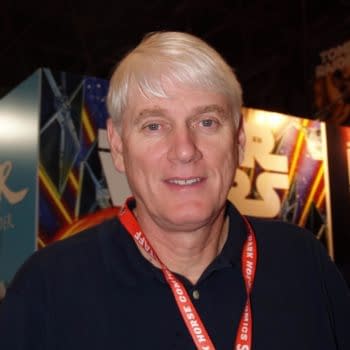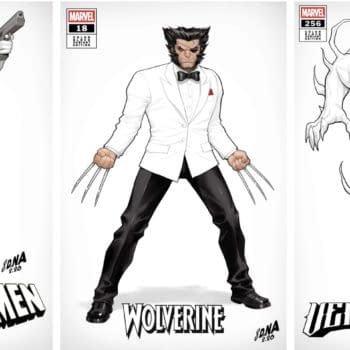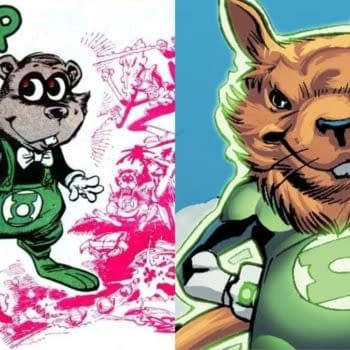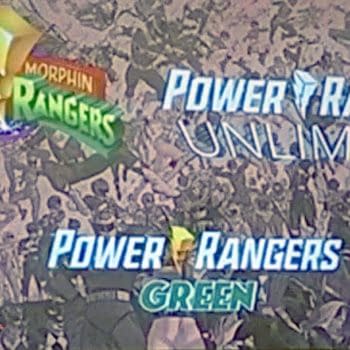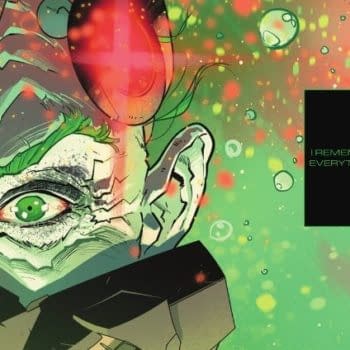Posted in: Comics, Recent Updates | Tagged: Alisa Kwitney, Batman: No Man's Land, Bill Sienkiewicz, chuck dixon, Comics, Danys Cowan, daredevil, dc comics, Declan Shalvey, denny o'neil, Derek Dingle, devin grayson, dwayne mcduffie, entertainment, eric stephenson, greg rucka, Hardware, Jonah Weiland, Joseph Illidge, Joshua Dysart, michael davis, michael zulli, milestone, Shawn Martinbrough, teenage mutant ninja turtles, The Color Barrier, thief of thieves, Verge Entertainment, vertigo, warren ellis
A Career of Milestones – Joseph Illidge Talks Hardware, Batman, Diversity, And Verge Entertainment
By Nikolai Fomich
[Joe Illidge at Midtown Comics in NYC, Photo Credit Milo Stone]
Joseph Illidge has been many things – editor, writer, businessman, and columnist – but throughout his wide-ranging career one thing has always remained the same – his love for comics. With over twenty years of experience working in the industry – at Milestone, DC Comics, Verge Entertainment, and Comic Book Resources – Joe hasn't only been a witness to the changes we've undergone – he's also been a part of them. And he's just getting started.
I sat down with Joe to talk about his early years at Milestone, working on Batman: No Man's Land, diversity in comics today, and his future projects.
Nikolai Fomich: Joe, why do you love comics? What is it about them that appeals to you more than other forms of popular art?
Joseph Illidge: Comics have a way of telling stories that no other medium does. For one thing, if you look at film and television, you can't get the internal narrative of a person the same way you can in comics. I love the fact that you can bend time between panels, that you can see two or three different layers of narrative simultaneously. Any medium that combines words and pictures is really amazing, and the sequential art form of comics does it beautifully.
I grew up on comics as a kid. When I was in second grade, my mother would take me to the newsstand, where she would buy soap opera magazines for herself and comics for me. And my father, he actually liked the offbeat comics – Jonah Hex, Scalphunter, Sgt. Rock, and Deathlok, strangely enough. At the time I didn't get why he liked those characters, but I later realized those were the kinds of characters he liked when he was younger – cowboys and Indians, and soldiers. Deathlok, even though he's a character from the future, had a soldier element to him.
But in terms of what's special about comics, I'll tell you this: I recently moved back to my home town in Brooklyn, and because of that I had to give away about six boxes worth of comics. I decided to give them to Goodwill. My fiancée and I couldn't get there in time, they asked us to leave the stuff outside, and so we did. People started picking through those comics like crows to a corpse. A kid picked up a box up all by himself, and I asked him, "Are you going to read all those comics by yourself?" and he said "Yeah!", and his father picked up another box. An elderly man said, "Wow, I love Superman!", and another one said, "My favorite character is Captain America."
I was reminded that beyond all the cynicism and all the politics and all the disillusionment within the comic book industry, that the medium itself touches so many people. And that's what's special about it. There's no limit of imagination, there's no limit whatsoever to what you can do in a comic book, and that's why I love them. The infinite possibilities.
NF: How about superheroes – any favorites? It seems you have a strong affinity for Batman.
JI: Batman's a great character. I think it's unfortunate that, when The New 52 launched, they did not use Batman to tap into what was going on in America with Occupy Wall Street – with the 1% and the 99%. The dichotomy of Bruce Wayne as a member of the 1% fighting for the 99% is so rich. I feel like an opportunity was missed. But what's great to me about Batman is that someone could be the Batman. Take away the costume – with enough money and enough drive and purpose, someone could do what the Batman does. Daredevil is a great character. Again, if you take away the costume, you could still be a crusader like Matt Murdock. When I think about my favorite comic book characters, Spider-Man is one of them, because Spider-Man has such heart, and even with everything he does in his costumed identity, Spider-Man still has to struggle to make the ends meet, which is something many people can identify with. Wonder Woman is one of my favorites because Wonder Woman is a being of truth. What she believes is what she says and what she says is what she does. That's an amazing character trait I don't believe many people can claim.
My favorite character would probably be Rocket from Milestone Comics, not only because she was a writer, not only because she inspired a superhuman person to become a superhero, but because she took responsibility for her actions. After learning she was pregnant, she stopped being a superhero to raise her child. She really had a lot of heart, and that spoke to her co-creator, the departed Dwayne McDuffie, who was a man with a lot of heart.
[Rocket]
NF: The launch of the Milestone line of comics in 1993 was part of an amazing moment of change in the history of American comics, with DC's Vertigo imprint having been established in the same year and Image the year before. As someone who broke into the industry in 1993, how did it feel to be a part of that transformative era, and specifically a part of the first major Black-owned comic book company?
JI: It was literally a dream come true for me. As someone who had grown up on comics, to work at this start-up company with people whose work I was familiar with, four Black men doing what no group of people of color had ever done before, was amazing. I was on the ground floor of something special.
I started at Milestone as an intern and later became an editor, and I learned from the four Milestone founders. I learned about business, editing, and the importance of working well with people. I didn't realize how much of an impact we were making at the time. People come up to me today and say the reason they got up into comics was because of Milestone. They call me "sir," and though I still feel like a kid at heart, I respect that as affirmation of the effort we put into Milestone.
[Art by Bill Sienkiewicz]
NF: You worked both in the business side and the creative side of comics at Milestone. Why was it important to you as a professional to cut your teeth in each world?
JI: My desire to start a business, an intellectual property-based business, goes back many years. I had to start by understanding how such a business worked from the inside. The only position available was that of an intern, and I had to work for free and do grunt work. The Milestone founders observed my work ethic, and eventually gave me a part-time job. Every day, I learned pearls of wisdom from Derek Dingle, Michael Davis, Denys Cowan, and Dwayne McDuffie. Eventually, I decided I wanted to become an editor. I spoke with the founders, they supported the move, and I shifted gears. I became an Assistant Editor. Dwayne taught me a great deal about editing, as did Denny O'Neil, my second teacher. I'm blessed and fortunate to have had those two exceptional men as mentors.
NF: Let's talk a bit about Hardware, one of the company's flagship titles. When Dwayne McDuffie – may he rest in peace – chose you to become the sole editor on the title toward the end of its run, how did you approach the book and the character?
JI: It was important for me to stick to the core of Hardware, a title which dealt with the issues of the glass ceiling and of perseverance despite social and corporate obstacles. The previous editor, Matt Wayne, gave me sound advice – let the talent have the freedom to give you a story direction that you like. One of the things I did was hire D. G. Chichester as the series writer. He wrote amazing social fiction in Daredevil, and he did a great job with Hardware. We were able to end the series so that it thematically looped back well with the character's early status quo.
[Hardware]
NF: Working with Greg Rucka, Shawn Martinbrough, Chuck Dixon, and a slew of other talented creators on Batman, you helped produce some of the greatest stories featuring the Dark Knight – including No Man's Land, often considered the best Batman event ever. What did it mean to you to help create stories for the most popular superhero in history? What are some of your favorites?
JI: I'd also like to get Devin Grayson's name in there, a writer whose stories that were integral to No Man's Land. She did an amazing Leslie Thompkins story in Batman Chronicles and Denny O'Neil said she understood that character even better than he did. I'd also like to give a nod to Alisa Kwitney, novelist and former Vertigo editor, who wrote a story illustrated by Michael Zulli. Michael's work is known inside and outside of comics, and he drew the best Teenage Mutant Ninja Turtles storyline that I think ever saw print.
Working on Batman was an honor and a serious responsibility, because Batman is not just a character, Batman is a high-profile intellectual property engaged by two or three generations of fans at any time. When you're dealing with the mythology of Batman, you have to find a balance that meets the needs of those different audiences.
I worked with one with one of the greatest editorial teams in comics – Denny O'Neil, Jordan Gorfinkel, Darren Vincenzo, and Frank Berrios. No Man's Land was unprecedented, basically a one year long weekly story, before there was a television show like 24, before there was a DC maxi-series like 52. To do that and tell a grounded story of social fiction, and to work with all of those talented creators, some of whom had never dealt with the Batman or superhero comics– it was an adventure every day. When there were problems, we would get together in conferences and solve them.
One of the first things I did as a member of the Batman editorial group was create the big map that outlined all the issues, and the work progress of all of those issues. There was a No Man's Land bible that Jordan Gorfinkel created as our foundation, but in terms of the day to day work, acting as a showrunner of sorts for No Man's Land was my responsibility, supervised by Denny O'Neil.
[No Man's Land]
NF: In addition to working on Batman, you founded your multimedia production company Verge Entertainment with Shawn Martinbrough, the illustrator of Image's Thief of Thieves series, and video game designer Milo Stone. What were the challenges in starting your own production company, and what future projects should fans expect from the creators at Verge?
JI: The biggest challenge is time. When you're maintaining a job and a freelance career, carving out time is difficult. But Shawn, Milo, and I are committed to doing it, because we all agree there needs to be more culturally-diverse casts within a variety of genres.
Additionally, Verge has worked with a variety of high profile clients, including Howard Theater Restoration, Inc., the organization that led the collaborative effort with the District of Columbia and other private entities to restore the Howard Theatre in Washington, D.C. In that way, Verge was able to contribute to Black history on a real-world level.
Verge Entertainment has a library of original ideas and stories with transmedia potential – stories that can be adapted into graphic novels, films, prose, and more. A lot of the work and time the three of us have invested has resulted in alliances with various production companies on projects that will come to light. Having worked with so many talented individuals in the publishing, television, and film industries, Shawn, Milo and I have a good contact list of creators for partnerships.
[Art by Chriscross]
NF: Switching gears, it seems like every day there's another article critiquing the comic book industry's treatment of race, gender, and other important issues related to identity and representation in comics. You have been an outspoken critic on these issues. Why do you think these kinds of discussions are important?
JI: Before we can change the landscape is to change, we have to understand its rules. The reasons why there's a lack of interest in certain creators in comics are in many ways no different from any other corporate industry. Once we recognize those reasons – one of which is, of course, money – we know how we can move to address them. It's the end of the complaint cycle, of the righteous anger cycle. What's coming next is what I call the empowerment narrative, led by those who are succeeding every day in spite of the obstacles. Talented people – editors, colorists, writers, artists, business people – whose efforts toward the realization of an equal playing field for people of color, for women, for the LGBT community, are bearing fruit. It's not just about black people.
[The Color Barrier]
NF: You describe your own column on CBR, "The Color Barrier," as "a series about diversity in comics." What were your goals in creating this column and what do you have planned next?
JI: Originally, The Color Barrier was designed to be a celebration of diversity for Black History Month, but Jonah Weiland, the Executive Producer, realized that it had a greater life. He allowed it to extend into March, and then to wrap up in April, based upon the amazing response we received from the comic book community, from the fans, professionals, and people outside the comic book community.
The column was able to act as a point of coalescence for feelings that a lot of people have, but would only speak about privately, or would speak about publicly but in all these different areas. The fact that The Color Barrier was able to represent a much needed focus for those voices is significant.
Since I've been given the opportunity to make it into a regular column, what I'm going to do is take it to the next level. I don't want to reveal what that is yet, but it's going to be the natural evolution of "The Color Barrier," and the empowerment narrative I spoke about earlier. You should be seeing that [soon], shortly before the San Diego Comic Con.
NF: Without pigeonholing different communities into one, how healthy or unhealthy a place do you think our industry is with regards to its treatment of women, people of color, and LGBT people, both in terms of the characters found in the comics and in terms of actual creators out there?
JI: Unfortunately, even though there seem to be more women in comics than ever before, the industry has never been so horrifying and open in its victimization of women. It needs to be dealt with. There are crusaders fighting the good fight, people like Gail Simone, Janelle Asselin another former Batman editor, Laura Hudson – those people are out there fighting for change.
The Black community may still be the one with the smallest level of corporate and editorial influence in mainstream comics. Jim Lee is Co-Publisher at DC, Axel Alonso is the Editor-in-Chief at Marvel. I don't know of any prominent Black individuals in the hierarchy of mainstream comics.
However, the diversity within the independent comics scene is amazing. There are many independent comic creators of different ethnicities and backgrounds, a number of whom distribute digitally, telling their own stories.
NF: Outside of achieving a healthier diversity in talent, what are the challenges facing comics today that you find most pressing? What do you think about Eric Stephenson's remarks in his February ComicsPRO speech?
JI: Eric Stephenson is a brilliant businessman, and I believe all of his actions are with the intention of helping the comic book business, of helping the comic book medium, and of helping Image Comics. People said he was highly critical of the mainstream industry and of mainstream superhero fiction, but the fact of the matter is I've heard a lot of people say the same things Eric said, but they don't have the courage to say them in public. Facebook doesn't count. When you achieve enough power that you can say the unpopular thing in public and you're doing it in the service of a good cause, more power to you. I don't have a problem with that.
I think the industry is still a bit limited in its collective thinking. Monthly twenty-two page comic books for $3.99 is part of a business model that is hard to sustain without gimmicks. We're just starting to utilize digital technologies in interesting ways. Also, the price points are a detrimental factor. I'm all for great stories, good characters, intriguing events, but buying four comics and spending $20 dollars? I don't think that's a good business model to attract a greater audience.
One of the things I love about Image is that you can get Velvet or Thief of Thieves or Starlight for $2.99. That to me is an ideal price point. $3.99? I can go with that, I've bought Warren Ellis and Declan Shalvey's Moon Knight and Harbinger written by Joshua Dysart. But I think once you go past $3.99, you're approaching the cliff with a lot of consumers. If the industry can find a way to give all of the monthly periodicals more appealing price points, I think that would help attract a larger audience.
NF: Finally, what does the future hold for Joseph Illidge? Where can we expect you next?
JI: I've been an editor for high profile characters with high profile companies. I've worked on the business side. So the future will involve my greater contribution as a writer of fiction and as a writer of columns, the emergence of Verge Entertainment into the comic book and graphic novel scene, and my reintroduction to San Diego Comic Con, which I haven't attended in seven years. Going back to SDCC is the opening stage in strengthening alliances with great talents in comics, whom I've known for the last fifteen to twenty years.
I want to be more on the front lines to help build an equal landscape for people from diverse backgrounds in both entertainment and in business, and similarly on the fictional level in the representation of characters.
Come back later this week where Joe and I continue our conversation and talk about The Ren, a noir graphic novel about crime, love, and the power of art set in the Harlem Renaissance, written by Joe and Thief of Thieves' Shawn Martinbrough, and illustrated by Grey Williamson.
Nikolai Fomich is a freelance contributor to Bleeding Cool and college teacher. He is currently researching African history for his comic book series African Odyssey, about a time traveling history professor from Africa's future. Alas, he does not have a Kickstarter…yet.

















